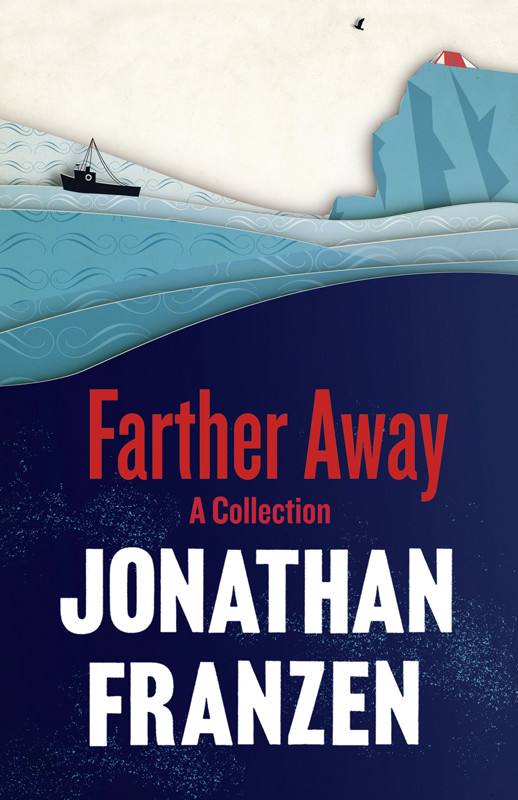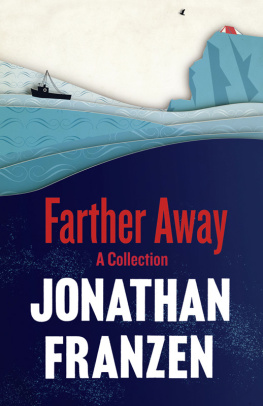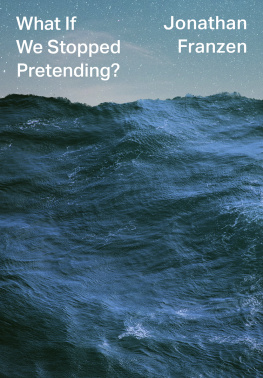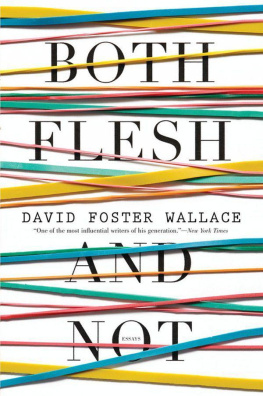
To Tom Hjelm, for the lessons in writing,
and to Gran Ekstrm, for the lessons in travel
Contents
[commencement address, Kenyon College, May 2011]

Good morning, Class of 2011. Good morning, relatives and faculty. Its a great honor and pleasure to be here today.
Im going to go ahead and assume that you all knew what you were getting into when you chose a literary writer to deliver this address. Im going to do what literary writers do, which is to talk about themselves, in the hope that my experience has some resonance with your own. Id like to work my way around to the subject of love and its relation to my life and to the strange technocapitalist world that you guys are inheriting.
A couple of weeks ago, I replaced my three-year-old BlackBerry Pearl with a much more powerful BlackBerry Bold, with a five-megapixel camera and 3G capability. Needless to say, I was impressed with how far the technology had advanced in three years. Even when I didnt have anybody to call or text or e-mail, I wanted to keep fondling my new Bold and experiencing the marvelous clarity of its screen, the silky action of its tiny track pad, the shocking speed of its responses, the beguiling elegance of its graphics. I was, in short, infatuated with my new device. Id been similarly infatuated with my old device, of course; but over the years the bloom had faded from our relationship. Id developed trust issues with my Pearl, accountability issues, compatibility issues, and even, toward the end, some doubts about my Pearls very sanity, until Id finally had to admit to myself that Id outgrown the relationship.
Do I need to point out thatabsent some wild, anthropomorphizing projection in which my old BlackBerry felt sad about the waning of my love for itour relationship was entirely one-sided? Let me point it out anyway. Let me further point out how ubiquitously the word sexy is used to describe late-model gadgets; and how the extremely cool things that we can do now with these gadgetslike impelling them to action by speaking incantations, or doing that spreading-the-fingers iPhone thing that makes images get biggerwould have looked, to people a hundred years ago, like a magicians incantations, a magicians hand gestures; and how, when we want to describe an erotic relationship thats working perfectly, we speak, indeed, of magic . Let me toss out the idea that, according to the logic of technoconsumerism, in which markets discover and respond to what consumers most want, our technology has become extremely adept at creating products that correspond to our fantasy ideal of an erotic relationship, in which the beloved object asks for nothing and gives everything, instantly, and makes us feel all-powerful, and doesnt throw terrible scenes when its replaced by an even sexier object and is consigned to a drawer: that (to speak more generally) the ultimate goal of technology, the telos of techne, is to replace a natural world thats indifferent to our wishesa world of hurricanes and hardships and breakable hearts; a world of resistance with a world so responsive to our wishes as to be, effectively, a mere extension of the self. Let me suggest, finally, that the world of technoconsumerism is therefore troubled by real love, and that it has no choice but to trouble love in turn.
Its first line of defense is to commodify its enemy. You can all supply your own favorite, most nauseating examples of the commodification of love. Mine include the wedding industry, TV ads that feature cute young children or the giving of automobiles as Christmas presents, and the particularly grotesque equation of diamond jewelry with everlasting devotion. The message, in each case, is that if you love somebody you should buy stuff.
A related phenomenon is the ongoing transformation, courtesy of Facebook, of the verb to like from a state of mind to an action that you perform with your computer mouse: from a feeling to an assertion of consumer choice. And liking, in general, is commercial cultures substitute for loving. The striking thing about all consumer productsand none more so than electronic devices and applicationsis that theyre designed to be immensely likable. This is, in fact, the definition of a consumer product, in contrast to the product that is simply itself and whose makers arent fixated on your liking it. Im thinking here of jet engines, laboratory equipment, serious art and literature.
But if you consider this in human terms, and you imagine a person defined by a desperation to be liked, what do you see? You see a person without integrity, without a center. In more pathological cases, you see a narcissista person who cant tolerate the tarnishing of his or her self-image that not being liked represents, and who therefore either withdraws from human contact or goes to extreme, integrity-sacrificing lengths to be likable.
If you dedicate your existence to being likable, however, and if you adopt whatever cool persona is necessary to make it happen, it suggests that youve despaired of being loved for who you really are. And if you succeed in manipulating other people into liking you, it will be hard not to feel, at some level, contempt for those people, because theyve fallen for your shtick. Those people exist to make you feel good about yourself, but how good can your feeling be when its provided by people you dont respect? You may find yourself becoming depressed, or alcoholic, or, if youre Donald Trump, running for president (and then quitting).
Consumer-technology products, of course, would never do anything this unattractive, because theyre not people. They are, however, great allies and enablers of narcissism. Alongside their built-in eagerness to be liked is a built-in eagerness to reflect well on us. Our lives look a lot more interesting when theyre filtered through the sexy Facebook interface. We star in our own movies, we photograph ourselves incessantly, we click the mouse and a machine confirms our sense of mastery. And, since our technology is really just an extension of ourselves, we dont have to have contempt for its manipulability, the way we might with actual people. Its all one big endless loop. We like the mirror and the mirror likes us. To friend a person is merely to include the person in our private hall of flattering mirrors.
I may be overstating the case, a little bit. Very probably, youre sick to death of hearing social media dissed by cranky fifty-one-year-olds. My aim here is mainly to set up a contrast between the narcissistic tendencies of technology and the problem of actual love. My friend Alice Sebold likes to talk about getting down in the pit and loving somebody. She has in mind the dirt that love inevitably splatters on the mirror of our self-regard. The simple fact of the matter is that trying to be perfectly likable is incompatible with loving relationships. Sooner or later, for example, youre going to find yourself in a hideous, screaming fight, and youll hear coming out of your mouth things that you yourself dont like at all, things that shatter your self-image as a fair, kind, cool, attractive, in-control, funny, likable person. Something realer than likability has come out in you, and suddenly youre having an actual life. Suddenly theres a real choice to be made, not a fake consumer choice between a BlackBerry and an iPhone, but a question: Do I love this person? And, for the other person: Does this person love me? There is no such thing as a person whose real self you like every particle of. This is why a world of liking is ultimately a lie. But there is such a thing as a person whose real self you love every particle of. And this is why love is such an existential threat to the technoconsumerist order: it exposes the lie.
Next page












